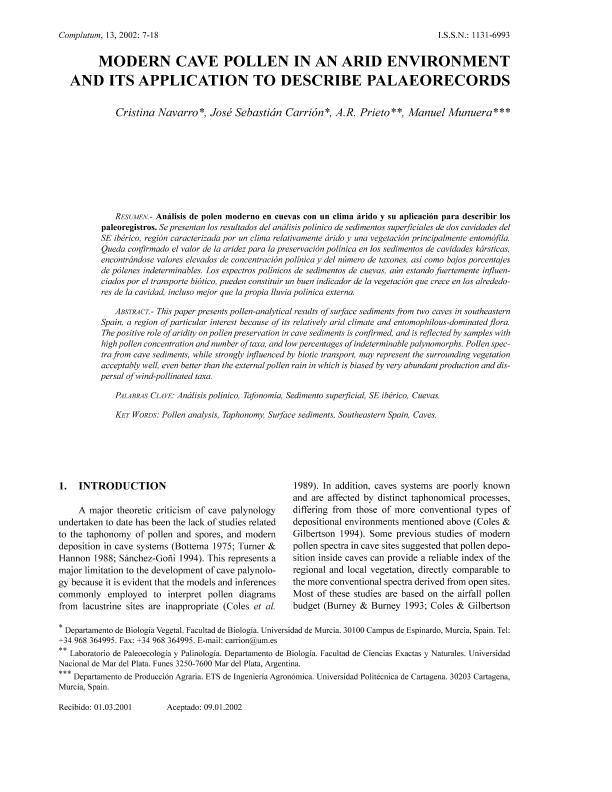Mostrar el registro sencillo del ítem
dc.contributor.author
Navarro, Cristina
dc.contributor.author
Carrión, José Sebastián
dc.contributor.author
Prieto, Aldo Raul

dc.contributor.author
Munuera, Manuel
dc.date.available
2021-03-25T19:42:17Z
dc.date.issued
2002-12
dc.identifier.citation
Navarro, Cristina; Carrión, José Sebastián; Prieto, Aldo Raul; Munuera, Manuel; Modern cave pollen in an arid environment and its application to describe palaeorecords; Universidad Complutense de Madrid. Facultad de Geografía e Historia. Departamento de Prehistoria; Complutum; 13; 12-2002; 7-18
dc.identifier.issn
1131-6993
dc.identifier.uri
http://hdl.handle.net/11336/128959
dc.description.abstract
Análisis de polen moderno en cuevas con un clima árido y su aplicación para describir los paleoregistros. Se presentan los resultados del análisis polínico de sedimentos superficiales de dos cavidades del SE ibérico, región caracterizada por un clima relativamente árido y una vegetación principalmente entomófila. Queda confirmado el valor de la aridez para la preservación polínica en los sedimentos de cavidades kársticas, encontrándose valores elevados de concentración polínica y del número de taxones, así como bajos porcentajes de pólenes indeterminables. Los espectros polínicos de sedimentos de cuevas, aún estando fuertemente influenciados por el transporte biótico, pueden constituir un buen indicador de la vegetación que crece en los alrededores de la cavidad, incluso mejor que la propia lluvia polínica externa. ABSTRACT.- This paper presents pollen-analytical results of surface sediments from two caves in southeastern Spain, a region of particular interest because of its relatively arid climate and entomophilous-dominated flora. The positive role of aridity on pollen preservation in cave sediments is confirmed, and is reflected by samples with high pollen concentration and number of taxa, and low percentages of indeterminable palynomorphs. Pollen spectra from cave sediments, while strongly influenced by biotic transport, may represent the surrounding vegetation acceptably well, even better than the external pollen rain in which is biased by very abundant production and dispersal of wind-pollinated taxa.
dc.description.abstract
This paper presents pollen-analytical results of surface sediments from two caves in southeastern Spain, a region of particular interest because of its relatively arid climate and entomophilous-dominated flora. The positive role of aridity on pollen preservation in cave sediments is confirmed, and is reflected by samples with high pollen concentration and number of taxa, and low percentages of indeterminable palynomorphs. Pollen spectra from cave sediments, while strongly influenced by biotic transport, may represent the surrounding vegetation acceptably well, even better than the external pollen rain in which is biased by very abundant production and dispersal of wind-pollinated taxa.
dc.format
application/pdf
dc.language.iso
eng
dc.publisher
Universidad Complutense de Madrid. Facultad de Geografía e Historia. Departamento de Prehistoria
dc.rights
info:eu-repo/semantics/openAccess
dc.rights.uri
https://creativecommons.org/licenses/by-nc-sa/2.5/ar/
dc.subject.classification
Otras Ciencias de la Tierra y relacionadas con el Medio Ambiente

dc.subject.classification
Ciencias de la Tierra y relacionadas con el Medio Ambiente

dc.subject.classification
CIENCIAS NATURALES Y EXACTAS

dc.title
Modern cave pollen in an arid environment and its application to describe palaeorecords
dc.type
info:eu-repo/semantics/article
dc.type
info:ar-repo/semantics/artículo
dc.type
info:eu-repo/semantics/publishedVersion
dc.date.updated
2021-01-18T15:48:02Z
dc.journal.volume
13
dc.journal.pagination
7-18
dc.journal.pais
España

dc.journal.ciudad
Madrid
dc.description.fil
Fil: Navarro, Cristina. Universidad de Murcia; España
dc.description.fil
Fil: Carrión, José Sebastián. Universidad de Murcia; España
dc.description.fil
Fil: Prieto, Aldo Raul. Consejo Nacional de Investigaciones Científicas y Técnicas. Centro Científico Tecnológico Conicet - Mar del Plata. Instituto de Investigaciones Marinas y Costeras. Universidad Nacional de Mar del Plata. Facultad de Ciencias Exactas y Naturales. Instituto de Investigaciones Marinas y Costeras; Argentina
dc.description.fil
Fil: Munuera, Manuel. Universidad Politécnica de Cartagena; España
dc.journal.title
Complutum
dc.relation.alternativeid
info:eu-repo/semantics/altIdentifier/url/https://revistas.ucm.es/index.php/CMPL/article/view/CMPL0202110007A
Archivos asociados
